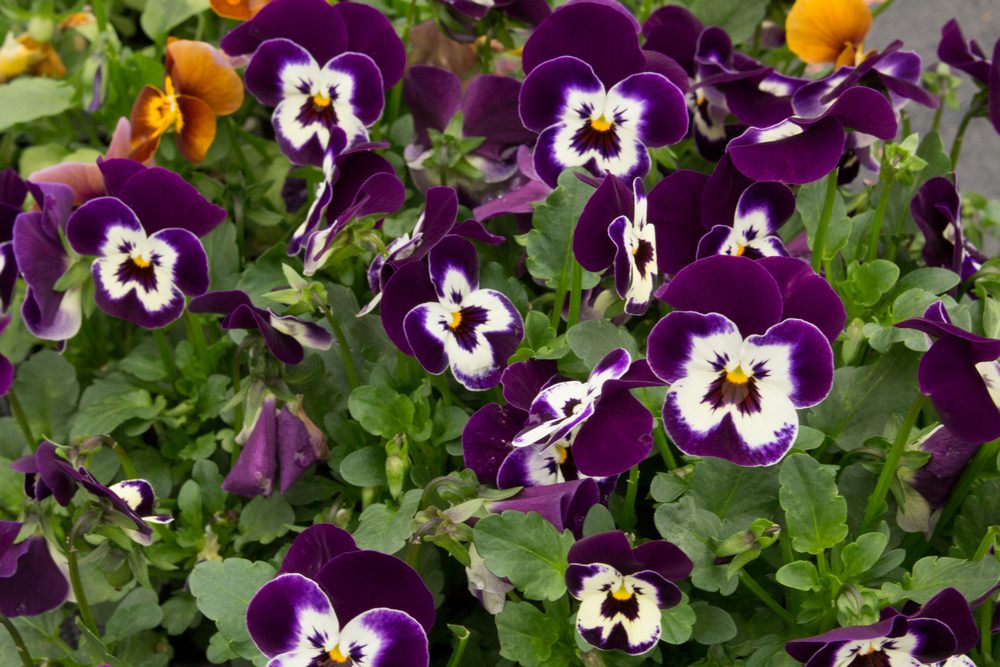
Years ago I worked for a garden centre just outside the English town of Nantwich. It was a time I remember fondly. I was out of school and out working in the grown-up world; I learnt a lot about people and plants, and how the two are connected. As anyone who has worked in public-facing jobs will tell you, not every interaction is positive. Some folks are just put on Earth to agitate and irritate others. I remember one customer becoming very agitated because we were selling the wrong type of violets. He had enjoyed success with a particular type of bedding violet the year before and was irate that we weren’t selling it again. Unfortunately when it comes to bedding plants the breeders are constantly at work creating new strains. This was of course our fault for some reason.

Bedding plants are always being bred for improved performance
He had found something that worked really well for him and he was determined to grow it again. That’s not unfair in principle, although the logic breaks down when you consider such variables as whether the summer was good or bad, what compost he was using, and even what fertiliser he gave his plants. If he’d been growing violets for several years then there’s every chance that he had mastered the art of successful cultivation. All the understanding in the world cannot change the fact that life moves on.
If only I could go back in time and explain what I know now; would it have made any difference? All I could do at the time was to give some pathetic apology as the man stormed off in disgust. I’ve since come to appreciate how plants and gardens work, to realise what is within my grasp to change and what is not.
The world is forever in a state of flux. Our homes are supposed to be a refuge from the things that annoy and frustrate us, places where we can exert benign influence. Gardens are a sanctuary where we can potter among the flowers to enjoy peace and tranquillity.

Gardens small or grand are places to get away from the world
But no matter how much we call our gardens to order there is no avoiding the fact that our gardens are inextricably linked to the world beyond the garden gate. A garden is an abstract version of nature but most definitely remains at the mercy of nature’s whims.
Seasoned gardeners are familiar with this. We know that sometimes we’re ahead and sometimes we’re behind, that nature can come down on us with great fury and at other times give us a helping hand. We come to understand our role as being one of giving guiding the garden rather than controlling it; the more firmly we try to control the garden the more it fights back until we’re left haggard and ruined by constant battles.

Nature can come down on us with great fury
How do we convey the fluidity of the garden to new gardeners? The huge number of gardening books, magazines, television programmes and online resources to tell you that you must sow seeds by this date and prune this plant by that point in the year, but until plants learn to read and obey this is really just a futile exercise. Nature is fluid; winter may be long or short, summers may be hot or mild, rain may come when we need it or not. For all our civilisation and shaping the world around us we must still follow the seasons as the plants and animals do. We can understand and we can adapt, but we cannot control.

Nature always pushes back
I fear so many new gardeners are being set up for failure (or at least a sense of failure) by the way gardening is taught. Garden educators and influencers speak of certainties where certainties cannot ever exist.
We see this in claims of cold tolerance; we’re so often told that a plant will survive our cold only for it to die or, sometimes, we’re told a plant is too tender and we’re pleasantly surprised when it survives. Cold hardiness depends on so many factors, depending on the plant in question: winter soil moisture/drainage, whether the plant will be buried under insulating snow when it’s really cold, and even whether cold arrives when the plant is at a particularly sensitive point in its growth cycle. Some plants will take quite serious cold in the depths of winter but be damaged by a light frost as their leaves emerge. The honest answer to whether any plant is cold hardy starts with “it depends…”.

Camellias have their limits but are not quite as tender as once thought
Our human world yearns for certainty. We want straightforward answers to life’s questions, yes or no. Gardens are created in a state of ambiguity and progress into unpredictability. At any point something may or may not change. This fluidity can be frustrating and I get that, but I wholly believe that the garden teaches us great philosophical lessons. We start a garden and it takes us on a journey, and surrendering ourselves to that journey gives us a good perspective on the world around us.
Fluidity originally appeared on GardenRant on February 24, 2025.
The post Fluidity appeared first on GardenRant.
